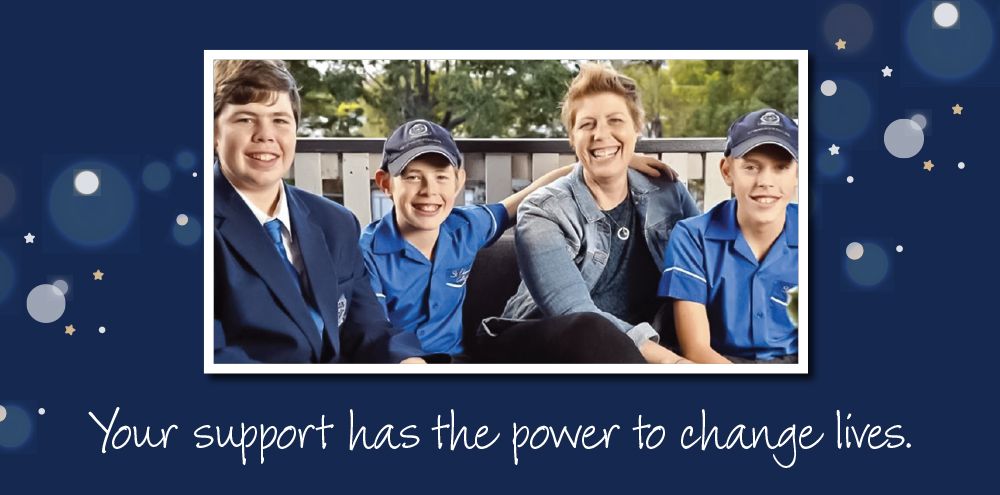Rebecca’s Story

Finding out that you have a life-threatening disease at just 42 years of age would be an overwhelming thought for most people, let alone sharing this news with your three sons. This is a feeling that many parents would dread to even imagine.
Ipswich mum Rebecca Baartz, had to live this reality, when what she thought was Irritable Bowel Syndrome (IBS) led to a colonoscopy test which delivered a positive result for bowel cancer.
As Australia’s second deadliest cancer, bowel cancer claims the lives of more than 100 Australians every week. It is estimated that around 300 Australians are diagnosed with the disease each week.
“I had softer stools and visited the toilet more frequently. I self-diagnosed (myself with IBS), believed that I was lactose intolerant and I even changed my diet accordingly,” Rebecca said.
But when implementing these lifestyle changes had no effect, Rebecca visited her GP, where she was then referred to a gastroenterologist for a colonoscopy.
“After the colonoscopy, I immediately needed to have another scan and knew something was wrong. I will never forget when the doctor said ‘This is not what I expected to find. I am so sorry to tell you this, but you have cancer’.”
As soon as cancer is detected somewhere other than the primary site (the original site where cancer began) in a patient’s body, they are automatically given a stage 4 cancer diagnosis. Due to the cancer spreading from her bowel through to her liver, Rebecca was diagnosed with stage 4 cancer.
From this initial diagnosis in February 2019, Rebecca describes the next phase as a whirlwind of craziness, filled with doctors’ appointments, scans and beginning her treatment plan.
Starting her first radiation treatment within just two weeks of the diagnosis, Rebecca completed radiotherapy with chemotherapy medication, in efforts to shrink the cancer, followed by bowel surgery to remove it.
“Thankfully, by the time I had surgery, the cancer had shrunk to be almost nonexistent—but I would still spend the next six months at Mater Private Hospital Springfield’s Cancer Care Centre receiving chemotherapy treatment.”
Before starting chemotherapy, Rebecca was given a temporary stoma (ileostomy)—an artificial external pouching system constructed for intestinal waste to be collected—to allow her bowel time to heal after surgery.
Devastated, Rebecca was committed to remain determined throughout her treatment journey. She kept as active as her body allowed, and found support in her Mater medical team, family, friends, work place and community organisations.
“I could not fault the care I received and the support that surrounded me; throughout my treatments, I was made to feel special, and it was all the little things done by the people around me that made my experience feel tolerable.”
“There’s so much about cancer and its effects that you can’t control, but what you can control is the way you choose to fight it.”
With her bowel cancer now removed, Rebecca’s treatment plan continues, with scans every three months to monitor the lesions on her liver, an annual colonoscopy, regular appointments with her surgeon, visits to Mater’s Cancer Care Centre, and psychologist support for her mental health.
“I want to spread awareness of bowel cancer, because it is not a disease that is commonly talked about,” Rebecca said.
“When I am asked about what signs I noticed, I can honestly tell people that I was unaware of any of the symptoms of this disease. And unfortunately, most of us would ignore many of the little symptoms anyway, because we assume bowel cancer only relates to the older generation.”
Rebecca urges people to learn more about the disease, because early detection greatly increases one’s chances of a positive outcome, or less invasive treatments.
“Like many cancers, bowel cancer is non-selective—it can affect anyone at any age, gender or race.”
“I would encourage people to speak up and not ignore the changes within your body or bodily functions. Symptoms that may appear to be insignificant, silly or embarrassing could lead to early detection.”
“Above all, remember that you know your body better than anybody else, and noticing these changes could be the one thing that saves your life.”
Your support of Mater Cars for Cancer funds vital research that seeks to unlock the secrets of bowel cancer which can make all the difference to patients like Rebecca.
Professor John Hooper is trailing a new precision-medicine agent designed to deliver imaging agents and anti-cancer drugs. This new agent has the potential to benefit patients with a number of cancers including colorectal (bowel), ovarian, and pancreatic cancer through a more precise and personalised approach to treatment that reduces side effects.
Our latest articles about:
